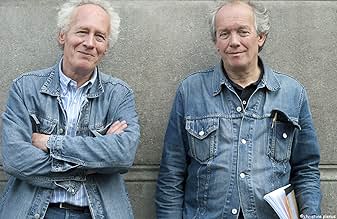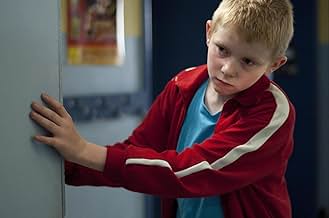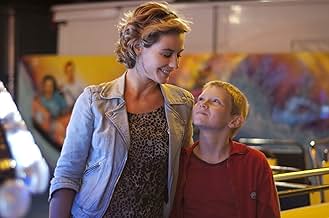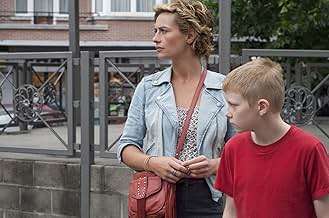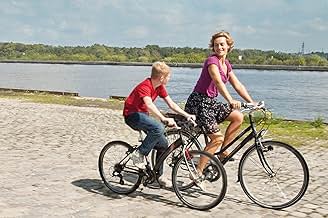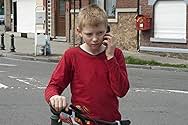IMDb-BEWERTUNG
7,4/10
29.179
IHRE BEWERTUNG
Von seinem Vater verlassen, wird ein Junge in einem staatlichen Kinderheim untergebracht. In einem überraschenden Akt der Nächstenliebe willigt die Friseurin des Ortes ein, ihn an den Wochen... Alles lesenVon seinem Vater verlassen, wird ein Junge in einem staatlichen Kinderheim untergebracht. In einem überraschenden Akt der Nächstenliebe willigt die Friseurin des Ortes ein, ihn an den Wochenenden bei sich aufzunehmen.Von seinem Vater verlassen, wird ein Junge in einem staatlichen Kinderheim untergebracht. In einem überraschenden Akt der Nächstenliebe willigt die Friseurin des Ortes ein, ihn an den Wochenenden bei sich aufzunehmen.
- Regie
- Drehbuch
- Hauptbesetzung
- Auszeichnungen
- 9 Gewinne & 31 Nominierungen insgesamt
Cécile de France
- Samantha
- (as Cécile De France)
Samuel De Ryck
- Éducateur 2
- (as Samuel De Rijk)
Empfohlene Bewertungen
without any introductions, the film gets down to the story. a kid on the phone is all but accepting to hear that the number he dialed is out of service. a precisely fluid social humanist film about a 11 year old kid and his relentless quests to go all the way to, against everybody's wishes, find a parent that wants nothing to do with him. basing his stance on the argument that his father would never leave without leaving him his bike.
once retrieved, the bike serves as the catalyst that allows the kid to advance, more in a figurative sense; we see him fight and bite for it. the last relic of a family life to him.
the kid in red is a lot of things: determined with rage and astounding obstinacy, always on the move, has nothing to lose so he goes to the limits. at one point, he nervously plays with a faucet as to not lose face in front of such injustice. but in his misfortune, Samantha, an adult portraying a kind stranger and genuine goodness, generosity and warmth, takes care of him. being emotionally distant, the kid rejects her at first and goes on exploring until he finally finds himself in his most despairing moment.. the kid remains a very interesting character to me, he is easy to deceive, capable of violence, but only because he is affectionate at heart and more honest than the people he deals with. which resonates with me as the film is able to kindle bits of memories of the audience.
once retrieved, the bike serves as the catalyst that allows the kid to advance, more in a figurative sense; we see him fight and bite for it. the last relic of a family life to him.
the kid in red is a lot of things: determined with rage and astounding obstinacy, always on the move, has nothing to lose so he goes to the limits. at one point, he nervously plays with a faucet as to not lose face in front of such injustice. but in his misfortune, Samantha, an adult portraying a kind stranger and genuine goodness, generosity and warmth, takes care of him. being emotionally distant, the kid rejects her at first and goes on exploring until he finally finds himself in his most despairing moment.. the kid remains a very interesting character to me, he is easy to deceive, capable of violence, but only because he is affectionate at heart and more honest than the people he deals with. which resonates with me as the film is able to kindle bits of memories of the audience.
I recently saw this at the 2012 Palm Springs International Film Festival. This was Belgium's official submission to the Academy Awards for Best Foreign Language Film and won the Grand Prix as the Jury Prize winner at the Cannes film Festival. Cyril Catoul (Thomas Doret) is living in a state run home and school for children after his single parent father Guy Catoul (Jérémie Renier) abandoned him. Cyril's father promised him that he wouldn't sell his beloved bike and when the father never returns to take him from the state care he sets out in search of his father and his bike. A kind single woman, Samantha, (Cécile De France) takes pity on him and tracks down the bicycle that his father had sold and buys it and returns it to Cyril. Samantha soon takes Cyril in to live with her part-time. Cyril is a very troubled young boy and is longing to belong and have a family. He has a temper and is a candidate for a troubled life. From writers/directors/producers the Dardenne brothers, this is a good story with fine acting. I'm sure for the role of Cyril, the directors instructed first time actor Doret, to act like a brat and be who he isn't. It worked well. De France is great as the strong and sympathetic Samantha. The story moves along well with a good score and nice editing. It's a little implausible at times and kind of far-fetched but it's a crowd pleaser and I would give it an 8.0 and recommend it.
"Not everyone can be an orphan." Andre Gide
A kid with only a bike and no mother or active father---now that's a setup for sentiment. Yet the Dardenne brothers have fashioned an unsentimental, realistic drama, The Kid with a Bike, about an 11 year old boy, Cyril (Thomas Doret), who is fortunately taken in by a guardian, town hairdresser Samantha (Cecile De France), but not without serious setbacks that are understandable given his unstable background.
The title evokes thoughts of the famous Italian neo-realist Bicycle Thief, in which a young boy is introduced to life's hard knocks through an imperfect father. In Kid, the father is a deadbeat deserter whose brief appearances are depressing because it's clear a reconnection with his son is not going to happen.
Cyril is running through most of the film, either by bike or foot, a motif signifying his desperate desire for a parent. However blood does not have to be in the loving equation as Samantha becomes a willing surrogate.
No surprise The Boy with the Bike won the Grand Jury Prize at Cannes (2011) and the directors several times before in multiple categories. The humanity rather than the technicality dominates the emotionality; the two principal actors, Doret and De France, are incomparably natural and convincing. Make no mistake, this is a film about a boy, whose character arc the directors fully present. Whether or not he ends up for good through all the turmoil is the pleasure of watching this soon-to-be classic.
You may think again about leaving your child with only his bicycle.
A kid with only a bike and no mother or active father---now that's a setup for sentiment. Yet the Dardenne brothers have fashioned an unsentimental, realistic drama, The Kid with a Bike, about an 11 year old boy, Cyril (Thomas Doret), who is fortunately taken in by a guardian, town hairdresser Samantha (Cecile De France), but not without serious setbacks that are understandable given his unstable background.
The title evokes thoughts of the famous Italian neo-realist Bicycle Thief, in which a young boy is introduced to life's hard knocks through an imperfect father. In Kid, the father is a deadbeat deserter whose brief appearances are depressing because it's clear a reconnection with his son is not going to happen.
Cyril is running through most of the film, either by bike or foot, a motif signifying his desperate desire for a parent. However blood does not have to be in the loving equation as Samantha becomes a willing surrogate.
No surprise The Boy with the Bike won the Grand Jury Prize at Cannes (2011) and the directors several times before in multiple categories. The humanity rather than the technicality dominates the emotionality; the two principal actors, Doret and De France, are incomparably natural and convincing. Make no mistake, this is a film about a boy, whose character arc the directors fully present. Whether or not he ends up for good through all the turmoil is the pleasure of watching this soon-to-be classic.
You may think again about leaving your child with only his bicycle.
This film takes place in Europe (Belgium, apparently) so it has far less of the violence that would accompany the same story set in America. But otherwise the story is particularly painful to watch because the essential elements - a kid without a father, his self-hate and anger, the substitute father figures laying in wait - are directly relevant to the American context. In a lean, tough story, the film takes us through a broad tour of the issues and risks and even reasons for hope in these situations. Young Thomas Doret fiercely embodies the aching and the rage of a boy who wants a father at any price and is a near-force of nature in trying to obtain what should be his by right. Cécile De France's Samantha has numerous real-life counter-parts, credited by more than one survivor of these dilemmas, but not always successful in their roles as passionate rescuers. How this particular story turns out is not so important as the realization that all across the world children live in Cyril's situation; some make it, many don't.
A beautiful film. One that pulls you in by the honest and genuine storytelling told in the Dardenne brothers' trademark naturalistic and guileless tone that is refreshing and sorely missed in today's too often rambunctious style of movies.
The story is simple and organic, the kid initially breaking out of foster care to find his father, and his bike both of which give him some identity and purpose in the world. He befriends several characters along the way (and in the Dardennes films, the characters are few, but all play vital roles) including the benevolent Samantha (whom I thought was very sweet but perhaps too pretty - and talented - to play a working- class hairdresser). Some characters are good (Samantha), some not so (Wes) and some have their own agendas to make a living.
In this way, the film is not unlike (and I quote the Dardennes) a fairytale - the boy (hero) on quest in the wide world which various characters and dangers lurking, yet set in this ultra realistic (read social-realist) setting.
The style of film-making here is pure and simple in that social-realist style, simply presenting characters who live on the fringe of society; who live in poor social economic conditions or don't have the opportunity of good schooling or the genuine love of a mother or father. As a result it is perhaps a little easier to understand why Cyril acts the way he does, rebelling against society, trying to find his place in the world. As you watch perhaps keep in mind what you might do to make ends meet.
The kid is astounding in a first-time performance, he conveys so much frustration, anger, pathos, regret with just glances and looks, most of the screen time without dialogue. Just watch the sequences when he is cycling on his bike, utterly free, chasing (or escaping) his life as the master of his own destiny.
This is a very simple & heartfelt tale, it tells the story as it is with no artifice, shot in the gorgeous dappled sunlight of a Belgian summer. It is not as hard-hitting and gritty as other of the Dardennes' films, such as emotional sledgehammers like Rosetta, Le Fils & L'Infant, but, it is still very good.
The story is simple and organic, the kid initially breaking out of foster care to find his father, and his bike both of which give him some identity and purpose in the world. He befriends several characters along the way (and in the Dardennes films, the characters are few, but all play vital roles) including the benevolent Samantha (whom I thought was very sweet but perhaps too pretty - and talented - to play a working- class hairdresser). Some characters are good (Samantha), some not so (Wes) and some have their own agendas to make a living.
In this way, the film is not unlike (and I quote the Dardennes) a fairytale - the boy (hero) on quest in the wide world which various characters and dangers lurking, yet set in this ultra realistic (read social-realist) setting.
The style of film-making here is pure and simple in that social-realist style, simply presenting characters who live on the fringe of society; who live in poor social economic conditions or don't have the opportunity of good schooling or the genuine love of a mother or father. As a result it is perhaps a little easier to understand why Cyril acts the way he does, rebelling against society, trying to find his place in the world. As you watch perhaps keep in mind what you might do to make ends meet.
The kid is astounding in a first-time performance, he conveys so much frustration, anger, pathos, regret with just glances and looks, most of the screen time without dialogue. Just watch the sequences when he is cycling on his bike, utterly free, chasing (or escaping) his life as the master of his own destiny.
This is a very simple & heartfelt tale, it tells the story as it is with no artifice, shot in the gorgeous dappled sunlight of a Belgian summer. It is not as hard-hitting and gritty as other of the Dardennes' films, such as emotional sledgehammers like Rosetta, Le Fils & L'Infant, but, it is still very good.
Wusstest du schon
- WissenswertesFor both the moments where Cyril is running from the police and ends up in the doctor's office and the opening scene when he's using the phone and won't let go, the young actor was just instructed by the directors not to give up what the character was doing under any circumstance.
- PatzerWhen the hairdresser is leaving the orphanage after she returned Cyrill's bike the car she is driving makes the sound of Diesel engine, but in the next scene with the same car the car sounds like it has a petrol engine.
- Zitate
Guy Catoul: It's too much. I can't look after him.
- VerbindungenFeatured in At the Movies: Cannes Film Festival 2011 (2011)
- SoundtracksAdagio un poco mosso
from Piano Concerto No. 5, Op. 73
written by Ludwig van Beethoven
performed by Alfred Brendel and the London Philharmonic Orchestra
conducted by Bernard Haitink
Top-Auswahl
Melde dich zum Bewerten an und greife auf die Watchlist für personalisierte Empfehlungen zu.
- How long is The Kid with a Bike?Powered by Alexa
Details
- Erscheinungsdatum
- Herkunftsländer
- Offizielle Standorte
- Sprache
- Auch bekannt als
- The Kid with a Bike
- Drehorte
- Produktionsfirmen
- Weitere beteiligte Unternehmen bei IMDbPro anzeigen
Box Office
- Bruttoertrag in den USA und Kanada
- 1.470.000 $
- Eröffnungswochenende in den USA und in Kanada
- 45.933 $
- 18. März 2012
- Weltweiter Bruttoertrag
- 7.182.147 $
- Laufzeit1 Stunde 27 Minuten
- Farbe
- Sound-Mix
- Seitenverhältnis
- 1.85 : 1
Zu dieser Seite beitragen
Bearbeitung vorschlagen oder fehlenden Inhalt hinzufügen

Oberste Lücke
What is the Japanese language plot outline for Der Junge mit dem Fahrrad (2011)?
Antwort

